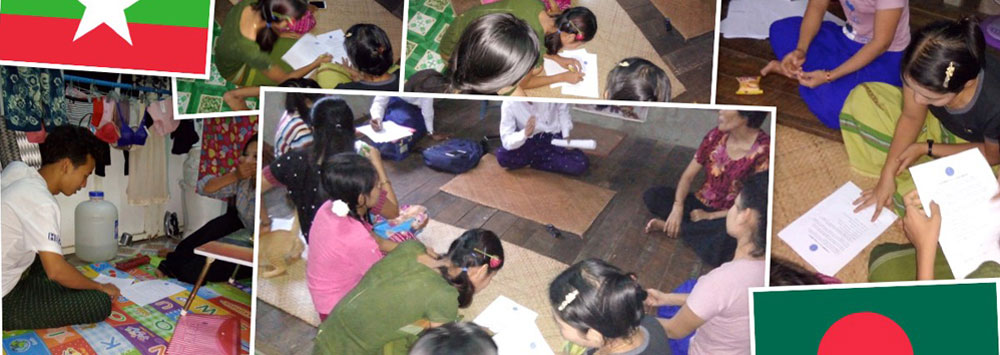Myanmar
What is happening in the garment sector in Myanmar?
by Alex Balch
There has been a massive increase in investment and employment in the garment sector in Myanmar in recent years. The Myanmar Garment Manufacturers Association estimates that employment in the sector will grow from 350,000 workers in 2017 to 1.5 million by 2024.
But plenty of concerns remain about working conditions amidst other major human rights problems facing the country. Since August 2017 the world has watched with horror the flow of refugees from the country – people from the minority Rohynga community who are fleeing what the UN described as a textbook example of ethnic cleansing.
International reaction to the Rohynga crisis has included discussion of the use of trade sanctions by the EU on textiles to put pressure on the government. Meanwhile there remain deep concerns about the extent of the political reforms and whether there has been a meaningful transition from full military rule in Myanmar’s ‘disciplined democracy’.
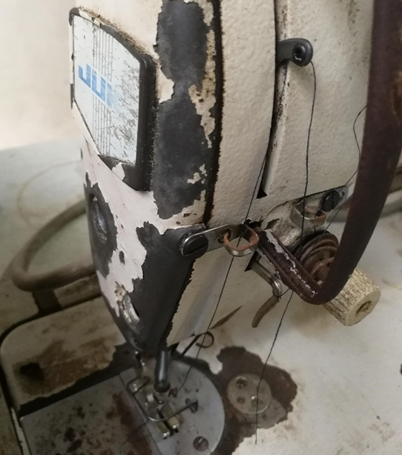
Fieldwork in Myanmar
Our fieldwork in Myanmar was conducted by a team led by Rebecca Napier-Moore (an independent researcher, specializing in migration, gender equality, and labour practices) and Future Light Centre, a civil society organisation, led by ex-political prisoner Ma Thet, that assists workers with labour disputes and provides training and awareness about labour rights.
The team conducted over 40 interviews with garments workers and 10 with stakeholders. The interviews asked about the experiences and challenges of working in the sector.
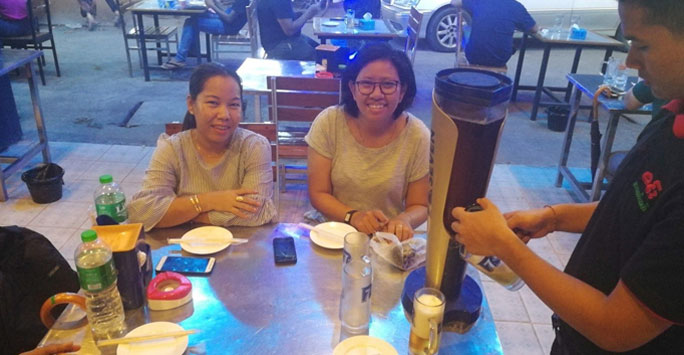
Image: Enjoying a cold drink after the focus group. Left – Ma Thet, Future Light Centre, Right – Haymann Zaw, interpreter.
In September 2018 Professor Alex Balch from the University of Liverpool (Principal Investigator for the Clothes, Chocolate, and Children project) visited to meet the fieldwork team and joined them to carry out some of the interviews with stakeholders and to hold focus groups with workers, assisted by an interpreter.
The timing of the research coincided with significant political developments, not least of which were discussions about a future reform of the labour law. In Myanmar the garment sector has moved to centre stage as simultaneously a potential target for sanctions while also being a major area for economic growth and national credibility in the global economy with its ability to attract foreign investment.
Workers in the sector have experienced a series of changes including rules around pay, hours and rights such as the introduction of freedom of association since 2012, However, there are claims about serious problems of implementation of these rules. A process of reform since 2015 (with ‘technical assistance’ from the ILO which has published a guide to the law) has led to political conflict in late 2018 over penalties for employers who do not comply with the law.
Bangladesh
What is happening in garments in Bangladesh?
by Jennifer Johns
The Bangladeshi economy became capitalist and opened to global trade in the late 1970s. The production of garments has become a key economic activity – in 2011 the read-made garment (RMG) sector was the second largest globally, after China. In 2015 garments generated 81% of exports from Bangladesh and accounted for 14% of GDP (Islam et al, 2016).
Bangladesh attracts overseas investment and international buyers from across the globe. Well known UK buyers, such as Next, Marks and Spencer, Tesco, Sainsburys etc. all source garments from Bangladesh.
However, concerns about safety and working conditions increased after a series of fires and worker deaths. In April 2010 garment production in Bangladesh became an international focus of attention following the tragic Rana Plaza building collapse.
The Bangladeshi government has since worked hard with international agencies to increase worker safety. The Accord on Fire and Building Safety in Bangladesh is a legally binding agreement between global brands and retailers and trade unions designed to build a safe and healthy Bangladeshi RMG industry. Many factories are now subject to safety checks international firms require certification of safety.
While some improvements in work safety have been observed, there are still serious concerns about worker rights. International buyers, including the firms subject to the UK Modern Slavery Act 2015, should be paying attention to worker rights in the RMG sector. Our research aims to understanding what impact, if any, work to improve transparency in this supply chain is having on the experiences of the Bangladeshis working in this sector.
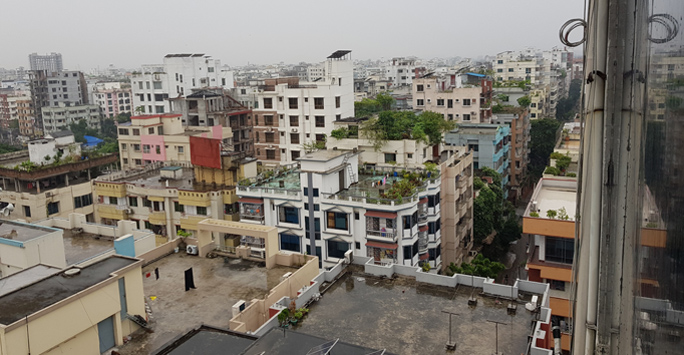
Fieldwork in Bangladesh
Fieldwork in Bangladesh began in July 2018. Mustafa Qadri, Syed Zainul Adebin (Eiffel) and Bishaw Bhabi (Dipa) conducted over 40 interviews with garments workers across Bangladesh. These interviews asked the workers about their past and current working experiences, aiming to capture an understanding of the lived experiences of workers. Our local team were able to gain insight into the challenges of working in the RMG sector and to identify issues with worker rights.
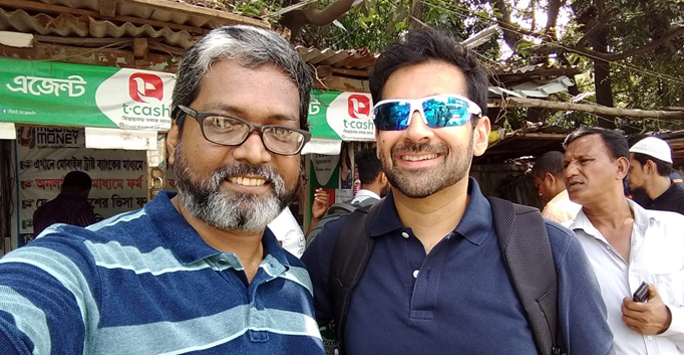
In early September 2019, Dr. Jennifer Johns (University of Bristol) and Leticia Ishibashi (FLEX), visited Dhaka to work with the project team. We were there to verify the data already collected, to review and approve the methodological processes used and to conduct worker and stakeholder interviews.
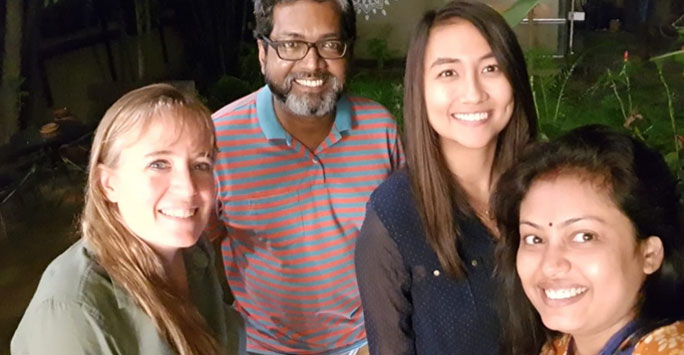
Stakeholder interviews were conducted with various agencies, including the ILO, Industrial Police, government ministers and trade unions (both local and international). We also interviewed factory owners and workers.
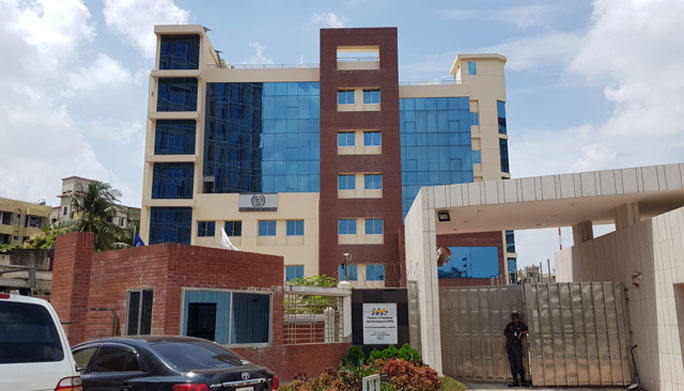
Dhaka is a challenging city to do research in, due in the main to the exceptionally heavy traffic and poor transportation infrastructure. The week that we spent in Bangladesh provided us with invaluable local knowledge and insight into the Bangladeshi culture and economy. Speaking to local stakeholders, and particularly local workers was a privilege and we felt renewed rigour to make meaningful contributions on ‘Modern Slavery’.
Back to: Department of Politics
